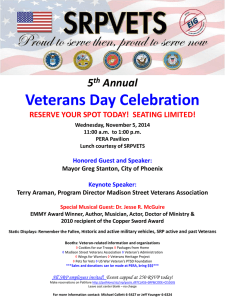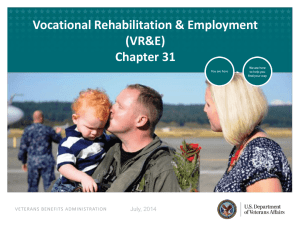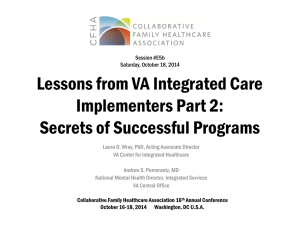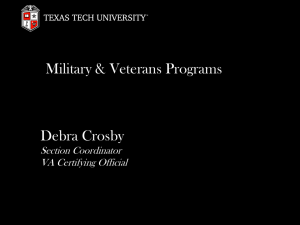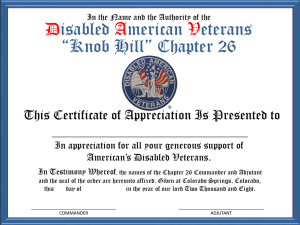Veterans Health Administration - Collaborative Family Healthcare
advertisement
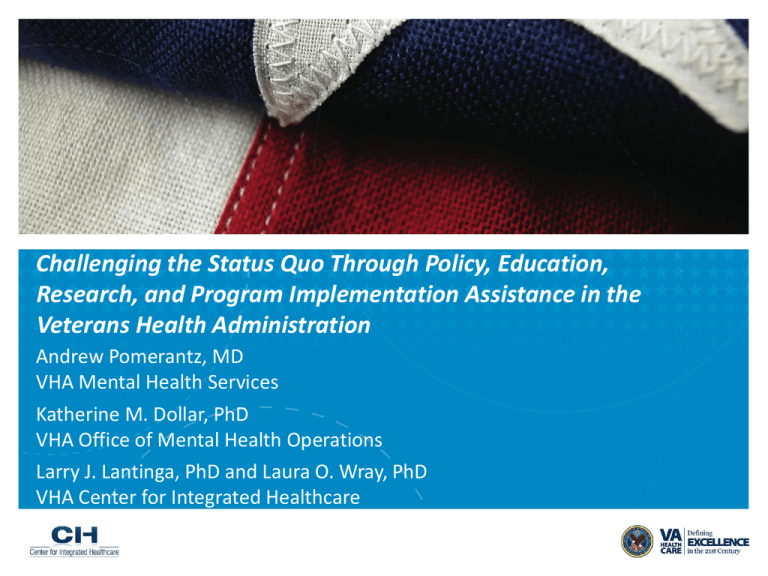
Challenging the Status Quo Through Policy, Education, Research, and Program Implementation Assistance in the Veterans Health Administration Andrew Pomerantz, MD VHA Mental Health Services Katherine M. Dollar, PhD VHA Office of Mental Health Operations Larry J. Lantinga, PhD and Laura O. Wray, PhD VHA Center for Integrated Healthcare Challenging the Status Quo in VHA: Policy (that began with a disruptive innovation) The Policy Challenge Policy to guide program development in over 1000 clinics, with 8 million enrolled patients in 50 states (plus Puerto Rico and Philippine Islands) Healthcare is local VETERANS HEALTH ADMINISTRATION 3 VA 101 • VA = Department of Veterans Affairs (since 1989) • Three subcomponents: – Veterans Benefits Administration (VBA) – National Cemetery Administration – Veterans Health Administration (VHA) • Vet Centers • Medical facilities and their associated Community Based Outpatient Clinics (CBOCs) – Organized into 22 regions called Veterans Integrated Service Networks (VISNs) • Distinction between Department of Defense Care and VA care – DoD provides care to active duty Service members and their families, and after discharge to some who had a significant career in the military – VA provides lifetime care to all eligible Veterans who choose to seek VA health care • VHA does not determine benefits but does provide relevant clinical information to VBA VETERANS HEALTH ADMINISTRATION Enhancing the Way We Provide Care “We are creating a healthcare system that is, first and foremost, patient centered and characterized by team care… We’re also striving, every day, for a healthcare system that is continuously improving, data driven, evidence based, and characterized by excellence at every level.” Robert A. Petzel, M.D. Under Secretary for Health Department of Veterans Affairs VETERANS HEALTH ADMINISTRATION Future of VA Health Care Past Present Future VA VA VA “What can I fix?” “How can we help what is wrong with you?” “How can we help you live the life you want to live?” Physician Clinical Team Veteran, Family and Health Care Team Case-Based Paper Medical Record Disease-Based Electronic Medical Record Whole-Person Electronic Health Record “We’ll address your immediate concern.” “You have a risky problem, please follow this plan to improve by your next visit.” “We can design your personalized health plan to meet your goals.” VETERANS HEALTH ADMINISTRATION PACT Team VETERANS HEALTH ADMINISTRATION 7 Primary Care-Mental Health Integration [PC-MHI] in VA • Two required components: • Care management • Co-located collaborative care • Blended programs link these complementary components • Focus primarily on common mental health conditions: • Depressive and anxiety disorders • Alcohol misuse and abuse • Psychological Trauma, including PTSD • Health Behavior Coordinators implement health psychology programs along with Health Promotion/Disease Prevention Program Managers VETERANS HEALTH ADMINISTRATION 8 Principles of Integrated Care in VA • Open or advanced access (temporal and spatial integration) in VA medical homes [Patient Aligned Care Teams] • Problem-focused assessment and treatment: tend to what the Veteran wants tended to • On-site clinicians in primary care: Consultation, collaboration, assessment; Part of treatment team, not enhanced referral • Stepped care • Measurement-based care • Care management • Referral VETERANS HEALTHmanagement ADMINISTRATION when needed Challenging the Status Quo in VHA: Implementation Support Office of Mental Health Operations Consultative Site Visits • All facilities visited in FY 12 – After initial visit , 1/3 of facilities to be visited each subsequent fiscal year • Process of Visits – Assess program implementation to ensure consistent with policy and fidelity to evidence base – Consultative – Identified areas of strength (Strong Practices for further dissemination) – Identified areas of growth • • Primary Care- Mental Health Integration frequently emerged as both an area for continued growth and was identified as a strength in several locations In response, technical assistance options for PCMHI implementation are being provided VETERANS HEALTH ADMINISTRATION 11 Implementation Support: A Stepped Care Process Multiple technical assistance options designed to meet a range of needs Facilitation: Most resource intensive option. Best for sites that could not implement without intensive support Consultation: Mid-level, best for sites needing more than education, who are likely to benefit from individualized technical assistance and program review Education: Least intensive option . Should be available in some form to all locations VETERANS HEALTH ADMINISTRATION 12 Triage: Matching Site-Level Needs to Level of Assistance • A data-driven triage process to ensure that locations get the level of support needed, wanted, and most appropriate • Data – OMHO consultative site visit findings – Progress to date – Penetration rates • Per clinic • Per provider – Unique and encounters – Interest and willingness to engage – Program operational status • CCC VETERANS •HEALTH CM ADMINISTRATION 13 Consultation • Provided by PCMHI experts • Varies depending on the needs and requests of the site • Phone calls – Individual – Group/Team • Might include a site visit or training and educational components • Discuss strong practices, link with similar locations VETERANS HEALTH ADMINISTRATION 14 Facilitation • A bundled set of implementation strategies – Combined skills of • A network or facility based internal facilitator familiar with local organizational structures, climates, clinical processes and, • An external facilitator who is an expert in evidence-based PC-MHI care models and facilitation • Techniques adapted for local needs, e.g.: – Education – Audit and Feedback – Mentoring VETERANS HEALTH ADMINISTRATION 15 Facilitation • Not all facilities need this level of support • Extremely resource intensive • Best for locations that have not yet been successful with education, or consultation alone and are unlikely to achieve full implementation without intensive technical assistance VETERANS HEALTH ADMINISTRATION 16 Facilitation • Reflects partnerships among – – – – – Researchers (CIH and MH QUERI), Policy Developers (e.g. MHS, PCMHI Program Office,) and those tasked with program and policy implementation technical assistance (OMHO) With clinical subject matter expertise To directly support implementation at the facility level VETERANS HEALTH ADMINISTRATION 17 Challenging the Status Quo in VHA: Education and Training Formal Program Rollout 20072010 • Large scale training, Denver Colorado • PC-MHI program office formed – Quarterly national trainings in multiple sites – Primary focus on operational issues • CIH accelerates its training and education mission – Quarterly trainings in Buffalo, NY – Focus on operational and clinical issues VETERANS HEALTH ADMINISTRATION 19 2011-present PACT trainings Shift to local and regional based PC-MHI trainings Recognized need to establish a training and education vision and strategic planning Growing recognition of “siloing” as “just another program Need to go beyond PC-MHI and incorporate as healthcare VETERANS HEALTH ADMINISTRATION 20 Mental and Behavioral Health in PACT Education and Training Workgroup • Convened in June 2012 • Composed of mixed group of integration subject matter experts (MH and PC) and experts in education, transformation, prevention, and systems redesign • Reviewed status of implementation of PCMHI • Strategies taken by a variety of VA offices to change • Made recommendations for national leadership and for workgroup’s continued activities VETERANS HEALTH ADMINISTRATION Mental and Behavioral Health in PACT Education and Training Workgroup: Recommendations for National Leaders: • Clarify PCMHI policy expectations • Fully communicate the long-term vision of integration • Direct program evaluation and research efforts toward: • Barriers to implementing Care Management • Strategies to promote sustainment • Implementation in CBOCs • Support nationally organized education efforts under the supervision of the Workgroup VETERANS HEALTH ADMINISTRATION Mental and Behavioral Health in PACT Education and Training Workgroup: National Education Workgroup Plans • Workgroup to serve as an oversight body • Identify current education needs of the field and gaps in portfolio of trainings being offered • Direct the development of products and/or events to address gaps as they are identified • Review all proposed training activities for consistency with national training needs • Oversee development of an inventory of current training resources • Remain abreast of status of implementation and make adjustments as progress continues VETERANS HEALTH ADMINISTRATION Mental and Behavioral Health in PACT Education and Training Workgroup: National Education Workgroup Plans: – Identify current education needs of the field and gaps in portfolio of trainings being offered • Work with VA’s Employee Education System to perform an education needs assessment of: – All PACT Members – PCMHI Staff – CBOC Staff – Mental Health Specialty Providers – Facility Administration and Leadership VETERANS HEALTH ADMINISTRATION Mental and Behavioral Health in PACT Education and Training Workgroup: National Education Workgroup Plans: – Based on Education Needs Assessment: • Identify short and long term national training goals and objectives • Identify specific training products/events to address needs identified – From within inventory of current resources – Lead the development of new products/events VETERANS HEALTH ADMINISTRATION Mental and Behavioral Health in PACT Education and Training Workgroup: National Education Workgroup Plans: – Education/Training Resources Needed: • Web-based Orientation Modules for PCMHI Staff 1. Skills-based Training » Brief Assessment » Evidence And Measurement-based Practice » Practice Management 2. Transformation to Patient-Centered and PACT Culture » » » » PACT Principles Advanced Clinic Access Strategies Collaboration and Teamwork Patient-centered Care and Prevention VETERANS HEALTH ADMINISTRATION TRAINING METHODOLOGY in an era of F2F restrictions • • • • • Webinars Mentoring groups Audioconferencing Video (live and archived) Manuals VETERANS HEALTH ADMINISTRATION 27 Challenging the Status Quo in VHA: Research PC-MHI Research in VA – In 1995 when some early VA adopters initiated primary care mental health integration the evidence base was in its infancy and VA was NOT supporting research in this area – In the early half of 2000 that began to change with VA beginning to fund research into care management of depression (TIDES) – At that same time VA clinician researchers also began to develop and test alternative care management models, e.g., Behavioral Health Laboratory (BHL) VETERANS HEALTH ADMINISTRATION PC-MHI Research in VA – Also during this time still other VA clinical researchers were developing and implementing one of the first colocated collaborative care models of PC-MHI, i.e., the White River Junction Model – VA’s initial policy calling for integrated primary care was based upon this early work and called for a national implementation based upon the White River Junction Model, TIDES, & BHL VETERANS HEALTH ADMINISTRATION PC-MHI Research in VA – VA recognized that more needed to be done to fully integrate mental health in primary care and in 2004 established the Center for Integrated Healthcare, a VA-designated Center of Excellence devoted to conducting research, education / training, and clinical consultation – The Center is now the locus of a large part of VA’s research focusing on how best to design and establish PC-MHI in all VA facilities VETERANS HEALTH ADMINISTRATION PC-MHI Research in VA – Center personnel are researching new & innovative ways to provide brief mental health interventions in the VA primary care setting targeting problems that Veterans often present with, e.g., PTSD, alcohol misuse, depression, insomnia, TBI, chronic pain – Center personnel are also examining the processes of the delivery of integrated primary care, e.g., whose doing it?, how does one assess fidelity to the model?, etc. VETERANS HEALTH ADMINISTRATION PC-MHI Research in VA – Center personnel are conducting studies to determine how best to implement PC-MHI in VA’s very large health care system, e.g., Blended Facilitation – VA has embraced PC-MHI for the long run. – It has devoted significant resources for the hiring of new personnel, it has establish a Center of Excellence to conduct research, education and training, and it has established a PC-MHI Program Office to track implementation across the nation VETERANS HEALTH ADMINISTRATION Challenging the Status Quo in VHA Questions/Comments?



